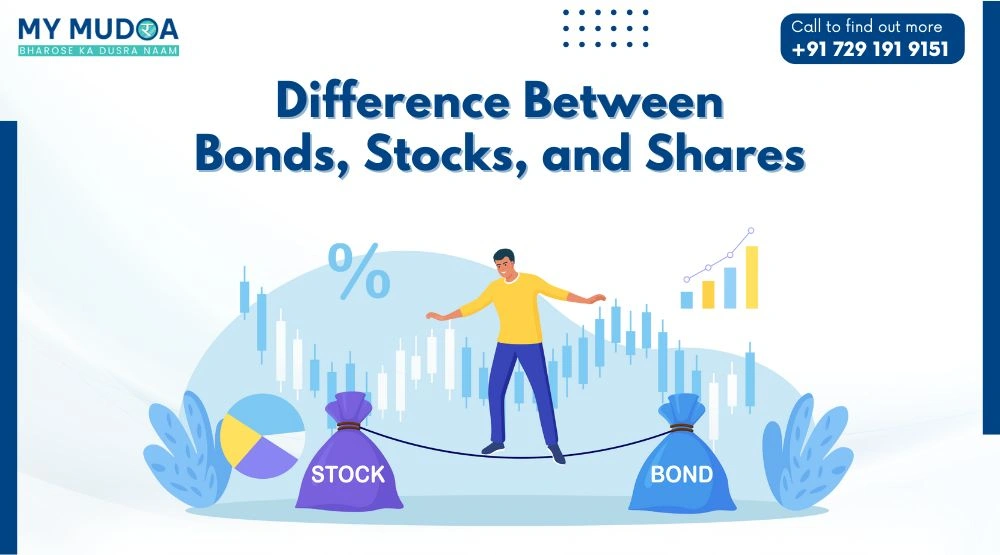
"Compare bonds, stocks, and shares easily. Learn how they function, their risk levels, returns, and how to build a balanced investment portfolio."

Published: 15 November 2025
If you are new to investing, knowing the difference between bonds and stocks, and in fact shares, is important for you. It is one of the first and most important steps. Shares, bonds and stocks are ways that you can use to invest your money. But they work very differently.
Understanding them helps you decide where to put your savings, how much risk to take and what kind of returns you can get. You can use this for your short-term or long-term goals.
Let's explore what shares, bonds and stocks are. Here you will see how they perform and how stocks and shares are connected.
Bonds are debt securities. When you buy a bond, it means you are giving a loan to a company or the government. In return, they pay you interest at regular intervals and give back your money when the bond ends. Bonds are called fixed income because the interest you get is steady and predictable.
Stocks mean you get a small part of a company. You become the owner of it. When you buy a stock, you become one of its owners. It is called a shareholder. Stocks can give you dividends which are a share of the company’s profit. Their price can go up or down in the market. They are riskier than most bonds, but they can give you higher returns over time.
There are important points you should know:
Stocks give you part ownership. Bonds make you a creditor. This is the basic legal difference between bonds and stocks.
Stocks tend to offer higher potential returns and greater volatility. Bonds normally give lower but steadier income. When markets fall, bonds often act as a stabiliser in your portfolio.
The people with bonds will get paid before shareholders when a company fails. That makes bonds safer in a company default.
Bonds pay interest regularly. Stocks may pay dividends, but they are not guaranteed. Dividend amounts can change.
Stocks mostly trade on exchanges. Bonds often trade over the counter and can have less transparent pricing.
You will see both terms used. The difference between stocks and shares is subtle:
In daily use, both words are often interchangeable. They mean the same thing. But technically, there is a small difference between stocks and shares as you can see here. You can use either term depending on what fits.
Always look at the latest rates and market data before comparing bond income and stock returns, as these numbers change every day.
Here is a comparison of shares, bonds, and stocks:
|
Feature |
Bonds |
Stocks |
Shares |
|
What you own |
A debt claim |
Equity ownership |
Unit of equity in a company |
|
Typical return |
Fixed interest |
Dividends + capital gains |
Same as stock (unit level) |
|
Risk level |
Lower (for similar issuer) |
Higher |
Same as stock |
|
Priority on default |
Higher |
Lower |
Same as stock |
|
Best for |
Income, preservation |
Growth, capital appreciation |
Ownership tracking |
|
Market access |
OTC, exchanges for gov bonds |
Stock exchanges |
Stock exchanges |
Smart investing helps your money grow. Here are easy tips to follow:
Understanding the difference between bonds and stocks is important for you. It helps you choose the right way you can use to invest your money. Bonds give you regular income and they are safer. Stocks can grow faster but their prices can go up and down.
You can use both to balance risk and reward. This way, your money can grow easily over time. It also helps you stay prepared for the changes that can happen.
Also Read:
- Best Bonds for Investment in India
- Smart Ways to Use Your Investments Without Selling Them
It all depends on what goals you have. You can use bonds if you want a steady income and low volatility. You can use stocks if you want growth and are ready to face the market changes. A mix of both works well as it can give you more benefits. You need to check the current bond yields and market conditions before you make a decision.
It depends on what you want from it. You need to know what your investment needs. Bonds can be a safer choice if you want steady and predictable returns. But if you are comfortable taking some risk for higher growth, stocks may work better for long-term investment.
Yes. You can. Many investors prefer to mix bonds, stocks and shares. It helps them to reduce risk. Bonds can give you stability. Stocks and shares can help your money grow faster. It is a good idea if you plan to mix them. It should be done based on your goals and comfort with risk.
💬 Comments
Leave a comment or ask a question!
Please Enter Your Name
Please Enter Your Email
Please Enter Your Phone
Please Write Your Comment